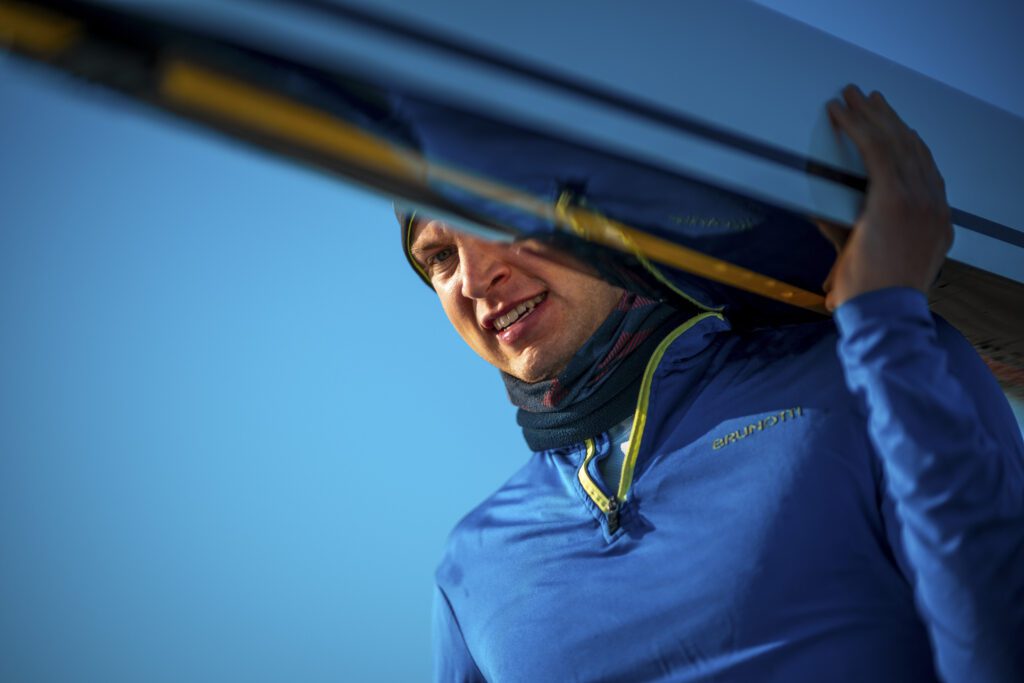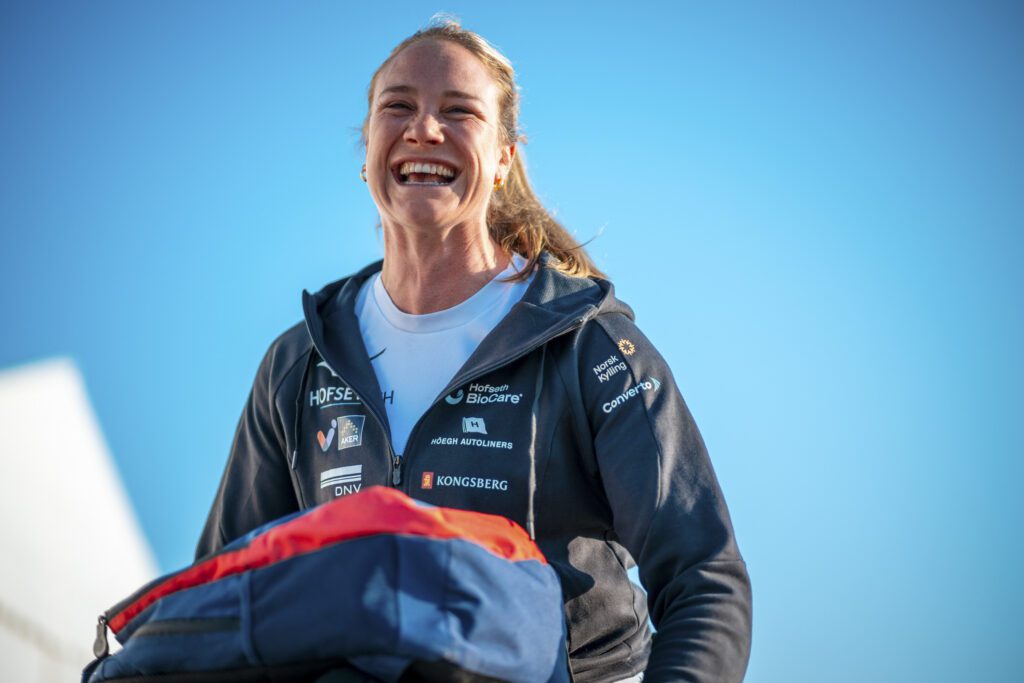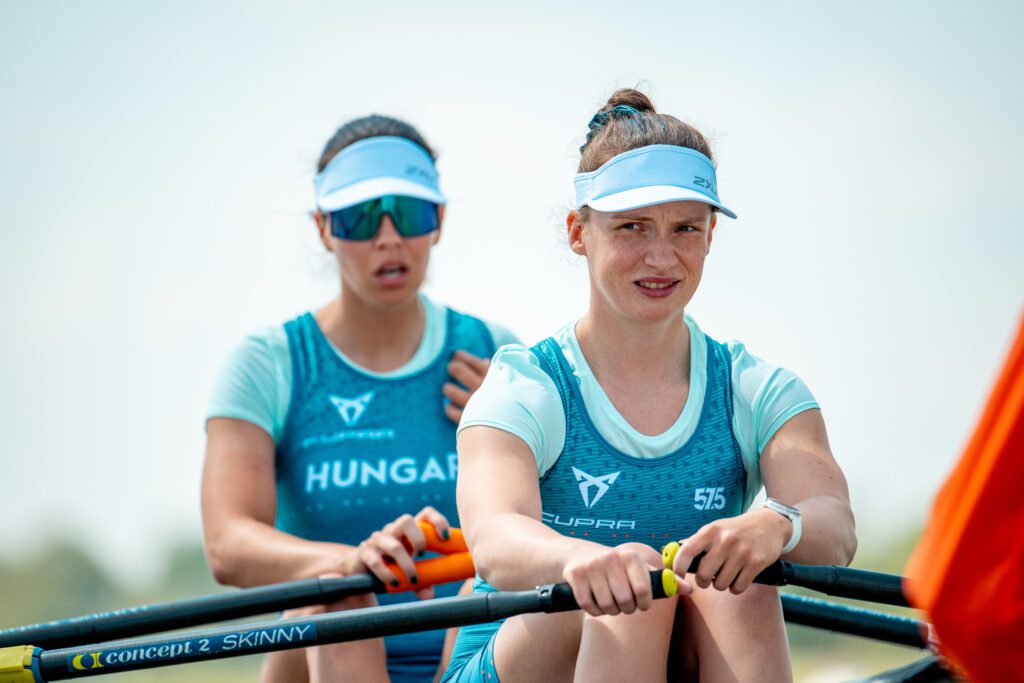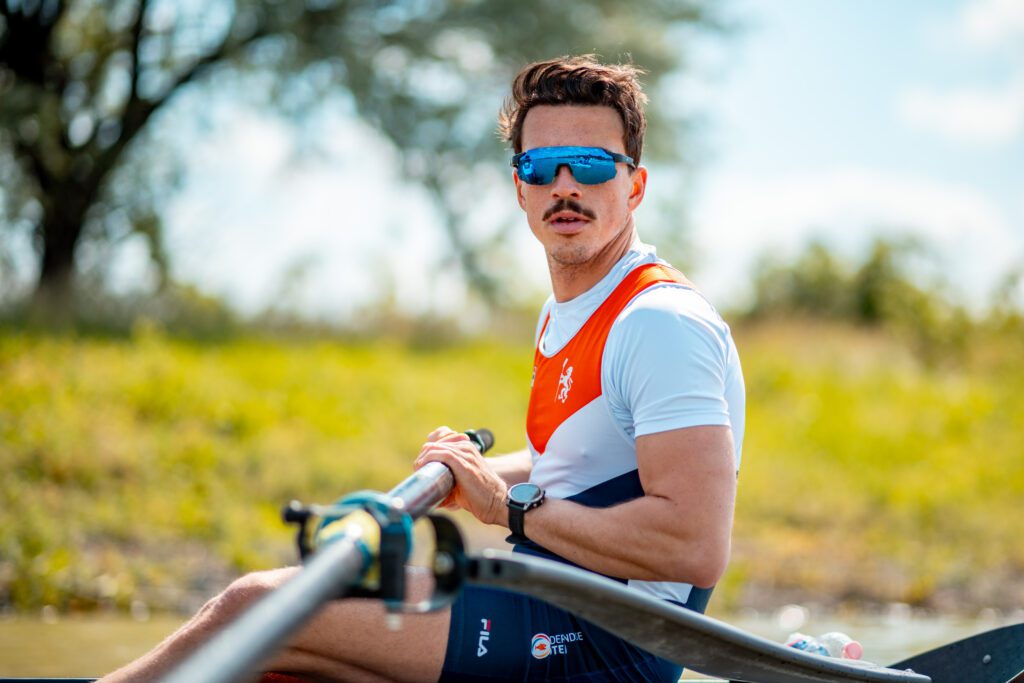Five years in the making, and finally the first swirling rowing medals of Tokyo2020 were awarded on a riotous day at the Olympic rowing course. The pattern on the front of the medal matched the erratic wind which swung from cross to tail and created speedy but tricky waters in which several crews came a cropper. We had crabs on the finish line, lactate-induced fatigue, steering issues and equipment trouble on one of the most eventful Olympic rowing days in history. That ended with nine countries already on the medal table, and five of them with at least one gold, an encouragingly wide spread. The rapidly rising winds made conditions tricky but fast, five Olympic best times and eight world best times being set over the day.
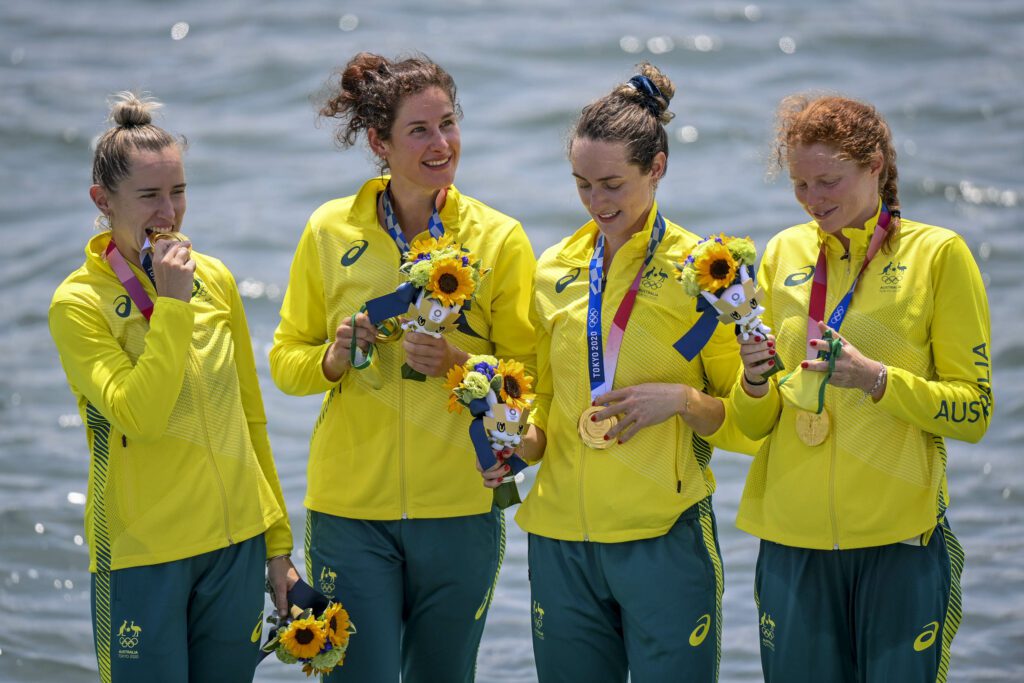
Photo Australia women’s four on Wednesday
The laurels must go to Australia, not only breaking their 21-year-long drought in the men’s four, but also claiming the women’s fours gold imperiously, Lucy Stephan able to add Olympic victory to her 2019 worlds title, with a newly reselected crew. It was an epic finale, the Aussies fending off a roistering charge to the line by the Dutch who had never let them lose contact, but they did it, albeit at the cost of Jessica Morrison and Annabelle McIntyre’s legs, which were so full of lactate two hours later that they were unable to finish higher than fourth in the pairs semis, balking them of a second A-final place. Gold in the four, which was their more winnable race, should be worth a pairs B-final. Behind the Dutch were Ireland, doing their customary last-500 push to claim a bronze medal which is the first ever for any Irish oarswomen at the Olympics.
It was the men’s fours which added commotion and incident to the day, after Britain’s four and the US quartet each had steering trouble for different reasons. GB, who veered off-course twice in the first half of the race, then edged towards leaders Australia as the final sprint began, and over-corrected to take them dramatically over the buoys into Italy, who sped out of the way to take bronze but were very aggrieved at the end. The umpire white-flagged the race only after a long pause, but though both Britain and Italy suspected it might have cost the Italians the silver, no protest was lodged. “I’m responsible, I forgot the steering a little bit and that cost us a medal,” said Oliver Cook. “To the lads, I’m sorry I didn’t steer us the best line at the end.” “We fully biffed into the Italians,” said two-man Matt Rossiter. “Maybe we cost them the silver and sorry to those guys.”
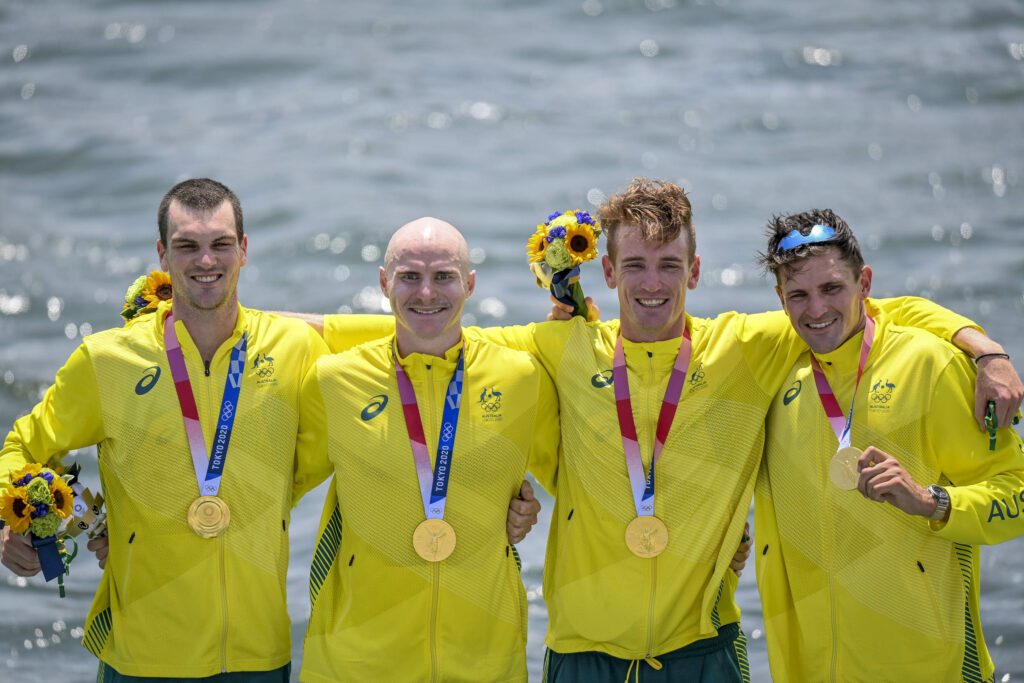
Photo Australia men’s four on Wednesday
For the Australians, redemption, victory, and a sense of restoration. “It’s been 25 years since the Oarsome Foursome, and a lot of crews have come close,” said Australian champion Jack Hargreaves. “Hilly just missed out in Rio and I was watching him in the pub last time so it was good to be out there today and help him get it over the line.” “We’re just super grateful to be sitting in that boat,” added Alex Hill. “Those legends before us have achieved what they have, so it was just amazing to put it back where it belongs.” “It was tighter than we thought,” said Alex Purnell. “There were a couple more strokes at the end that were dodgy and could’ve wiped off some speed, but the feeling when you looked up and saw ‘1’ and Australia, it all was overwhelming. Just a feeling that you can’t describe.”
Meanwhile the US four finished fifth after suffering problems with their skeg (fin) which had troubled them for weeks. “We have a different kind of skeg that no one really uses,” said Clark Dean. “This is I think the third time in about 20 rows that it’s broken and gone faulty on us. It just happened to be today where it breaks again. We were on the buoys the whole time, and there was nothing I could do: my toe was to starboard the whole time. It’s not an excuse, but we were on the back foot with an arm high behind our back.” But the conquerors of the day, with good reason, were Australia, magnificently taking a powerful lead early on and holding on without ever panicking as Romania and Italy charged past Britain to the line.
Italy were on a mission, set on reaching the podium after suffering what could have been a terrible blow earlier in the morning. Overnight Bruno Rosetti from the crew tested positive for coronavirus, and whilst none of the rest of the four was considered a close contact, they had to substitute him with Marco di Costanzo from the pair, with Vincenzo Abagnale taking di Costanzo’s place in the M2- semi-final later on.
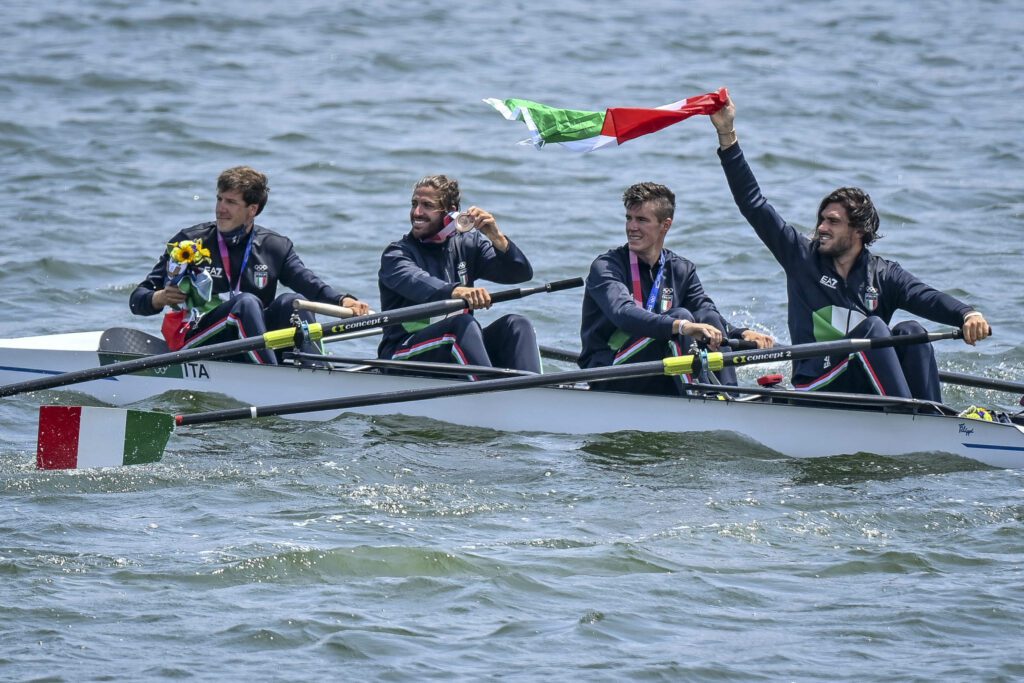
Photo Italy win bronze in the men’s four with a substitute on board
The double sculls were fabulous, Romania crowned queens by clear water in Tokyo after a regal performance which turned around the narrow loss to New Zealand in 2019, following the Kiwi selectors’ changes. Brooke Donoghue and Hannah Osborne (NZL) were never out of second but Ancuta Bodnar and Simona Radis (ROU) set off with great intent and quickly established their dominance. As ever at the Olympics the races for minor medals can be close but although the pack closed up near the line the Kiwis and Dutch were never really threatened by Lithuania.
The men’s double sculls medals were presented by FISA President and former French Olympic champion Jean-Christophe Rolland, who had great delight in giving the gold to Mattheiu Androdias and Hugo Boucheron. The two Frenchmen nearly didn’t qualify their boat in 2019 after Boucheron fell ill with toxoplasmosis before the world championships, but they scraped 9th in a blanket six-way B-final finish to claim a ticket to Tokyo and then fought the hardest possible battle for medals. At one stage, already trading blows with the Dutch, they had to push to kill off a serious attack from the Chinese crew, before speeding out ahead of the pack just behind the Dutch bow. With 300m to go, the French charge began, they claimed a narrow lead and then held it despite nearly catching a crab a few strokes before the line.
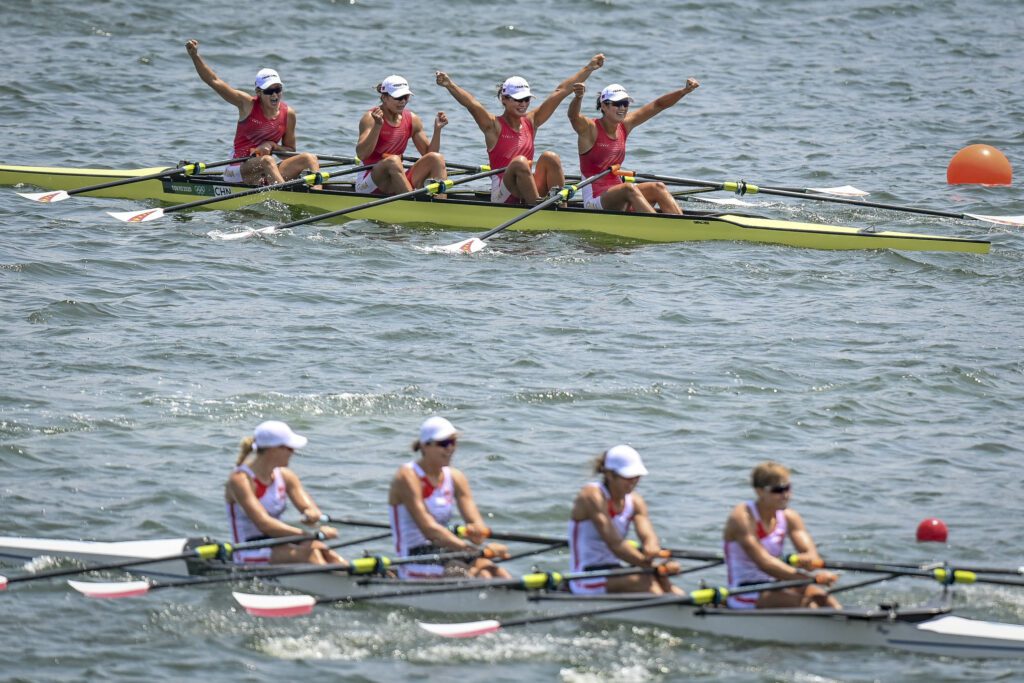
Photo China win in the women’s quad
If the Romanian W2x was regal, the Chinese W4x became empresses of the Olympics with a true coronation confirming their top spot bagged at 2019 with a world best time. It took so little time to soar out to an irresistible lead that the rest were left struggling in their wake, Poland eventually matching their 2019 silver with second at the Olympics after fighting off a superb sprint to the line by Australia. However this was after Germany, in contention for second, had crabbed multiple times just before the line to give away any chance of a medal. Before this Games China had never won more than one “home” gold (Beijing 2008) so this “away” title beats that, and along with the M2x bronze matches their best results ever.
Another 2019 quartet clung onto their crowns in the last final of the day, the Netherlands men’s quad defying COVID worries in their squad and confirming superstar status, though not without some faltering. Despite being as dominant as China in recent years, the Dutch quad has looked slightly under-powered here, and were beaten off the blocks by several crews including the British who led early. A minute after the start Dirk Uitenbogaard caught an unforced crab, though he recovered quickly, and the world champions had to work their way back to the front steadily over the next 500 metres. Meanwhile the Brits were enjoying the ride, capitalising when the Italians briefly caught a whole-stroke-side boatstopper (off-screen), and fighting like terriers when the Dutch began to come through. Here the champions’ quality showed, their smooth flow eating up the metres until they could take a clear lead. A safe gold for the Netherlands and Britain successfully defending silver against Australia and Poland to claim Britain’s first ever men’s quads medal at the Olympics.
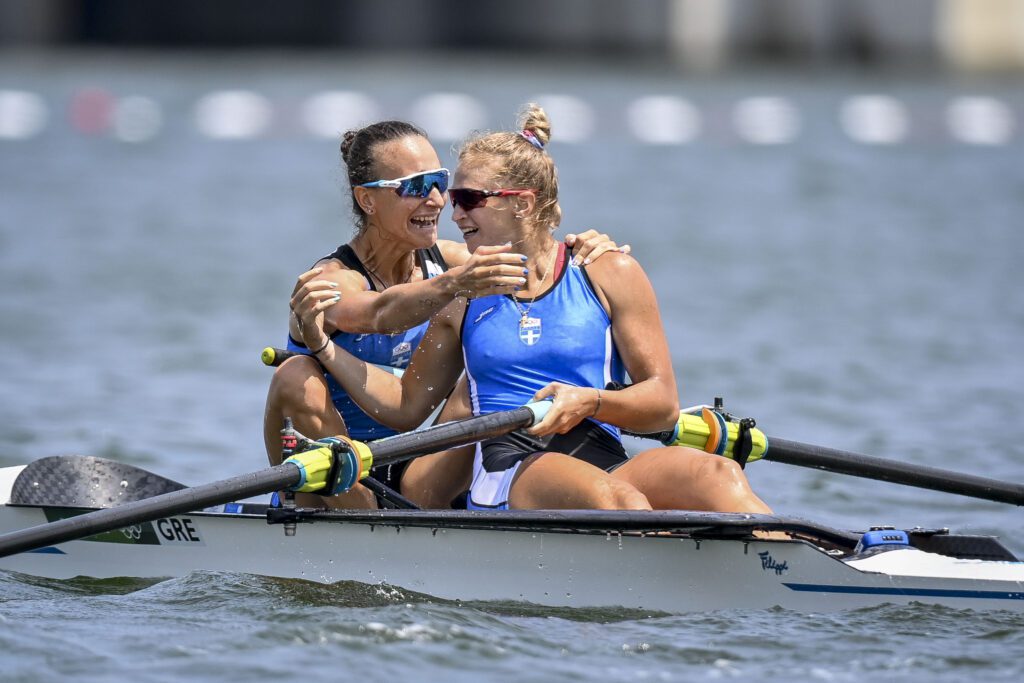
Photo In the semi-finals the Greek women’s pair set a new world best time in an astonishing win from an outside lane
In the semi-finals the Greek women’s pair set a new world best time in an astonishing win from an outside lane, which saw them holding the junior, under-23 and senior world best times for ten minutes before the New Zealand women’s pair promptly broke it again. It was the same race in which Australia’s energy flagged after their gold medal in the four. The second women’s pairs semi saw Romania’s excellent duo of Adriana Alincai and Iuliana Buhus abruptly ditched from the event, when they couldn’t hold Spain’s charge.
2013 LM2x champions Brun and Strandli (NOR) capsized during their semi and came last, withdrawing from the B-final the next day after Strandli was ruled out for medical reasons. This gave an opening for Uruguay’s Bruno Cetraro Berriolo and Felipe Kluver Ferreira to claim second ahead of the Czechs. It won’t be Uruguay’s first A-final appearance, since Eduardo Risso took silver in 1948 and there are also two bronze medals, but in the modern selective era it’s the next best thing.
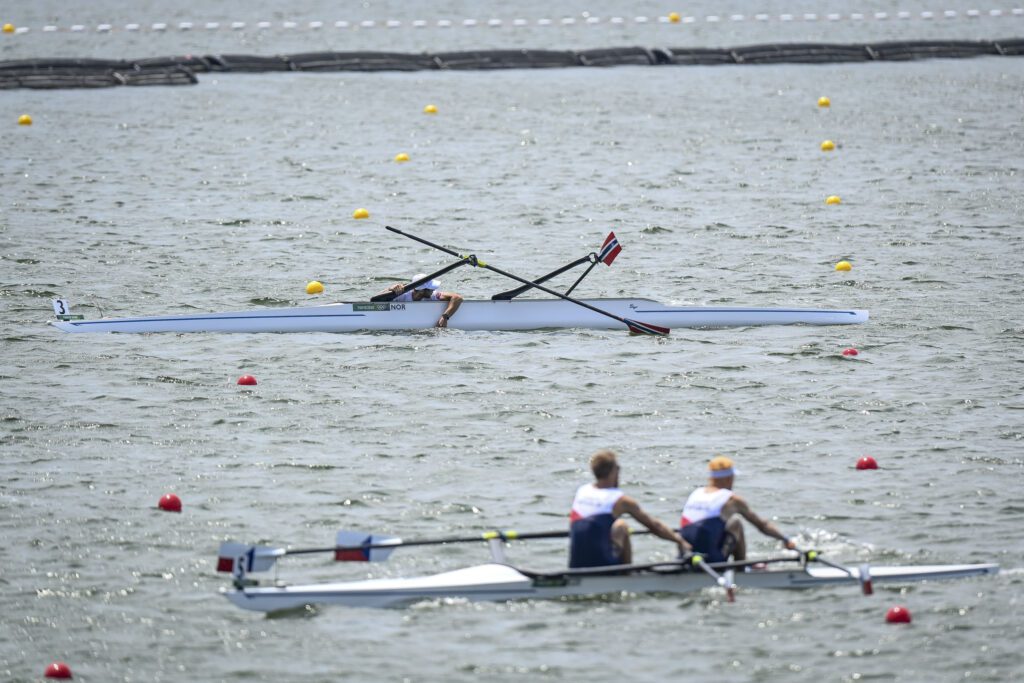
Photo 2013 LM2x champions Brun and Strandli (NOR) capsized in their semi
Mishaps continued in increasing wind as the Dutch M2- wobbled on the line giving away the third qualification place of their semi-final to Canada’s fast-closing Conlin McCabe and Kai Langerfeld. And in the women’s eights Britain were eight seconds off the rest, the repechage being won by a very dangerous-looking Romania after a sprint which put paid to Canada’s ambition. The men’s race was won by the Kiwis, who broke through a slender lead held for the first half by Great Britain. Romania were the slowest of the five and are on the plane home behind the USA and Australia. There are at least five crews who could get gold in both eights finals on Friday.
A feast of rowing after two days off, and two days yet to come.
